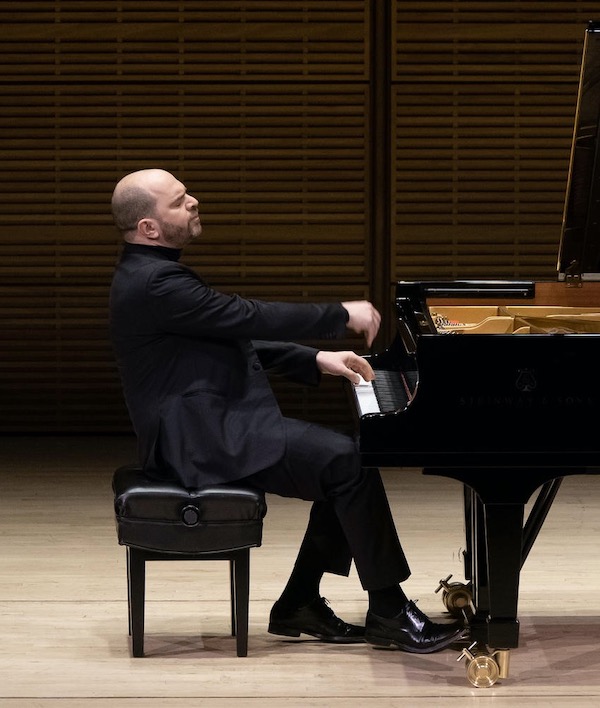Hungarians provide the highlights in Gerstein’s wide-ranging Zankel Hall program

No one will accuse Kirill Gerstein of being a timid artist. He approaches the keyboard with a total confidence that extends to his choices of repertoire.
On Thursday night he gave a recital in Zankel Hall that seemed intended not just to show off his own abilities, but to be a kind of survey of a broad range of pianistic style.
He began with restraint, offering Haydn’s Fantasia in C Major. Here, crisp accentuation brought out flashes of humor, even if Gerstein tripped once or twice over his fingers. Brahms’s Variations on a Hungarian Song was the first of a number of items on Thursday’s program in that form. Here, Gerstein showed tremendous range, finding a soft, dreaming quality in the third variation as a foil to the stormy complexity that leads into the pounding grandeur of the closing statement.
Selections from Kurtág’s Játékok stood out on the first half. Gerstein has been something of a champion of contemporary composers, which was evident in the sensitivity of his approach here, as he crafted a gorgeous line out of the daydreaming melody of “Hommage à Farkas Ferenc II”. Keeping the sustaining pedal down the entire time, he gave individual tones plenty of space to decay, converging on a fading dissonance yet without interrupting the melodic line.
He followed with a convincing rendition of Schubert’s Wanderer Fantasy. Gerstein’s touch was perhaps a little aggressive for Schubert’s particular brand of soft melancholy, but his voicing was excellent nonetheless, finding the direction of the music through clear differentiation of color. The heroic strain of the primary melody came through in his confident attack, and he showed off his exceptional range in the prismatic variations that followed, as much in the graceful dances as in the blazing flourishes leading up to the piece’s conclusion.
A trio of Hungarian dances by Liszt at the top of the second half felt a little superfluous, though Gerstein played them with flair. He attacked the Ungarischer Geschwindmarsch with bravado and evoked a sense of mystery in the Mephisto-Polka. A sly silliness hid just underneath the whirling mania of the Csárdás obstiné.
A brief but significant highlight of Thursday’s recital was the New York premiere of a Berceuse that Thomas Adès wrote for Gerstein. Taken from the lovers’ duet in Adès’s opera The Exterminating Angel, this miniature interlude leaves a powerful impression with its tangled emotions. Its initial haunting, whispered melody focuses and grows into storming intensity. Gerstein shaped the crescendo brilliantly, guiding the line finally to a series of quaking tremolos at the bottom of the keyboard, roaring as though out of a deep cave.
The program’s anchor was Liszt’s great Sonata in B minor, and Gerstein gave an interpretation that was rich, sensitive, passionate, and virtuosic. On an already varied program, this single-movement work offered an overview of Gerstein’s broad range of ability.
He treated the opening with stark drama, pounding the deep pedal tones that punctuate the melodic lines. Out of that brooding darkness Gerstein drew a big-hearted rendition of the piece, exploring in depth the many emotions that Liszt writes into the music. He perfectly captured the essential romantic spirit in contrasts between raging passion and misty-eyed nostalgia, blazing his way through the long stretches of torrid fury to set up the blissful reverie of the major-key melodies.
Gerstein’s passagework glittered from beginning to end, and he showed complete command and laser focus in the relentless ticking of the fugal section. Yet just as impressive was his ability to draw shining grace out of the piano, as when he cast a spell with the easy glow of his touch in the final Andante sostenuto section. Gerstein’s performance of this iconic sonata demonstrated exactly what makes Liszt, at his best, so compelling: technique not just for its own sake, but in the service of artistic expression.
A work like the Liszt Sonata demands encores, and Gerstein offered two: the first was Busoni’s Chorale Prelude on “Nun freut euch, lieben Christen, g’mein,” an irreverent little gem that set Bach’s simple chorale into giggling perpetual motion. More in keeping with the feeling of the rest of the evening was Chopin’s Waltz in A-flat Major, Op. 42, which radiated effortless grace, even as it sped by in a blur.






